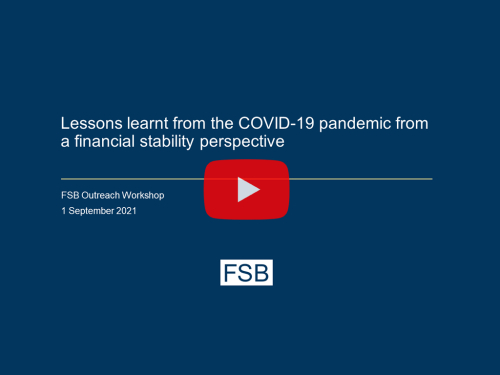Lessons learnt from the COVID-19 pandemic from a financial stability perspective: Final report
The Italian G20 Presidency asked the FSB to identify preliminary lessons for financial stability from the COVID-19 pandemic.
This final report updates the July interim report on the preliminary lessons learnt for financial stability from the COVID-19 pandemic, and outlines actions by the FSB and other standard-setting bodies (SSBs) in response to those lessons. The update reflects feedback from external stakeholders and the FSB’s Regional Consultative Groups, recent studies in this area, and progress made in relevant international initiatives.
Key lessons and actions include:
-
Market and institutional resilience. The functioning of bank capital and liquidity buffers may warrant further attention; the Basel Committee on Banking Supervision will update its overall analysis on the lessons from the pandemic. The March 2020 market turmoil underscored the need to strengthen resilience in the non-bank financial intermediation sector; the FSB is taking forward a comprehensive work programme. Some concerns about possible excessive procyclicality in the financial system remain; standard-setters will take forward work in procyclicality in margining practices and the Basel Committee will further monitor expected credit loss provisioning.
-
Operational resilience. COVID-19 has highlighted the importance of effective operational risk management being in place before a shock hits. The FSB will develop best practices for the types of information authorities may require related to cyber incidents to promote financial stability. The FSB is also launching further work related to third-party risk management and outsourcing, and will develop expectations for financial authorities’ use in oversight of financial institutions’ reliance on critical service providers.
-
Crisis preparedness. The pandemic highlighted the importance of effective cross-border cooperation, coordination and risk-sharing. The FSB will identify a set of good practices and emerging practices of crisis management groups to enhance preparedness for, and facilitate the management and resolution of, a cross-border financial crisis affecting a global systemically important bank (G-SIB).
The report also highlights broader policy issues that warrant further attention. These include: monitoring COVID-19 policy responses as they are wound down, in order to identify systemic vulnerabilities early on; addressing debt overhang in the non-financial corporate sector; promoting resilience amidst rapid technological change; completing the remaining elements of the post-2008 crisis reform agenda; and examining in due course how macroprudential policy has functioned during the pandemic and its aftermath.


